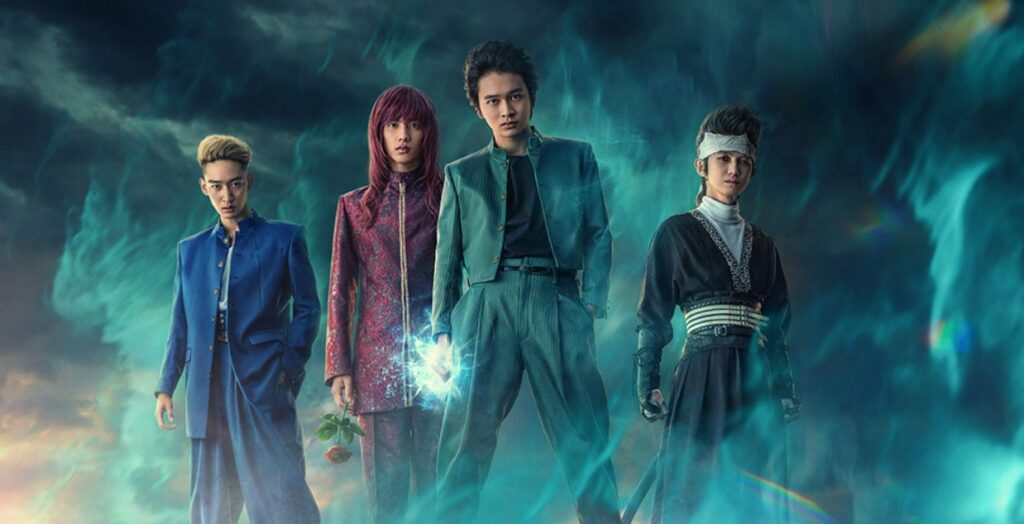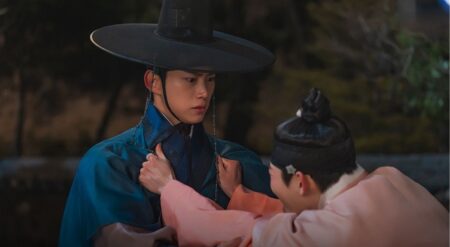When it comes to live-action adaptations of anime and manga, Japan (obviously) has been making some fantastic ones. While the shojo and josei live actions have been hit after hit, adapting shonen has proven to be harder, at least with critics. That said, the duo of Tokyo Revengers films have been loved by fans and critics alike (including me). It’s only natural that the live-action adaptation of Takemichi, Takumi Kitamura, would take on another role, this time as the iconic Yusuke Urameshi in Yu Yu Hakusho.
Netflix’s Yu Yu Hakusho adapts the legendary manga by Yoshihiro Togashi, originally serialized in Weekly Shonen Jump and published by Shueisha—but for Toonami kids currently humming “Smile Bomb,” you’ll know it from the anime adapted by studio Pierrot. In the series, Yusuke Urameshi is a brash and rough 17-year-old who spends most of his days getting into fights. But when he shows an act of heroism by saving a young child, he loses his life and gains a new purpose instead.
As he grapples with the fact that he is looking down on his dead body, a blue-haired woman in a kimono shows up. Named Botan (Kotone Furukawa), she is a guide to the spirit world afterlife and relays to him the shocking truth: no one expected a delinquent like Yusuke to die performing an act of goodness, and there was no place for him in either heaven or hell. Thus, Yusuke is given a chance to be revived, and after passing his trial, he becomes an Underworld Detective. From there, Yusuke becomes entwined in a mystery enveloping the human, demon, and spirit worlds.
Yu Yu Hakusho struggles to capture the tone of Togashi’s original work.

Yoshihiro Togashi’s writing and illustrations in both Yu Yu Hakusho and Hunter x Hunter bridge absurdity and sincerity. In live action, this can often feel like a tonal disconnect. How can you have a high schooler watching people grieve him right after meeting an adult with a pacifier in his mouth?
There are moments where it’s hard to grasp the tonal shifts, but the actors’ performances act as a tether between the seemingly disparate moments. Their sincerity, when you grab onto it, captures the heart of the manga series, and that’s what makes this adaptation another good one for the streamer and for Kitamura’s filmography. Good special effects help with managing these two tones from the absurdity.
While some elements don’t translate perfectly, like iconic costumes and hairstyles, what matters is that the story’s emotional core is intact. In Yu Yu Hakusho, the emotional core stands strong. It may be sped up with some pacing woes, but it’s there. Yu Yu Hakusho has always been a story about learning how to live and accepting the love of people around you.
The cool powers and dark tournament only go as far as the relationships in the series and how love is the central core, moving it all. Love between friends, family, and romance all work to build out a series that is more than its fights, and by capturing that, the Yu Yu Hakusho live-action is a success.
That success comes squarely on Kitamura’s performance as Yusuke and his ability to both throw his body into insane situations and maintain an emotional delivery while doing so. He embodies everyone’s favorite spirit detective with empathy and heart.
Kitamura embodies Yusuke, which makes Yu Yu Hakusho watchable.

Kitamura is Yusuke Urameshi in the same way he was Takemichi. By understanding who the character is at his core, the series, despite its pacing faults, will be a fun watch for existing fans. With Keiko (Sei Shiraishi) finding new life in the series and even appearances from Koenma (who is irresponsibly attractive) and Genkai, there is a lot here, though your acceptance of large changes will dictate how much you care for this iteration.
In that same vein, bad wigs don’t hold back the rest of the cast, with Jun Shison and Kanata Hongô as Kurama and Hiei reminding us why those who formed crushes on the men in their teens were totally right. However, of the extended cast, it’s Shûhei Uesugi as Kuwabara that matches Kitamura’s embodiment of their respective characters. Togashi’s Kuwabara is a teenage delinquent with a heart of gold.
He’s quirky and may not be the smartest tool in the shed, but he deeply cares about the people around him. That thug with a heart-of-gold persona is on full display in this series, but with only five episodes, the depth of what the character can be is left untouched.
The story’s main focus is Yusuke’s retrieval of three dangerous yokai objects and learning how to master his iconic spirit gun. That said, the short episode order doesn’t do the series any favors in highlighting the different levels on which the manga’s narrative operates.
The series gets close to nailing it, but you just can’t do that in only five hours. This is a snapshot of a series and one that makes chances to rush. Yu Yu Hakusho doesn’t hit the high of other Netflix manga adaptations like Alice in Borderland or One Piece, but it shows an unrelenting amount of promise its actors carry. Yu Yu Hakusho is good, but it really could have been great if given the time.
Yu Yu Hakusho is now streaming exclusively on Netflix.
Yu Yu Hakusho
-
Rating - 7/107/10
TL;DR
Yu Yu Hakusho doesn’t hit the high of other Netflix manga adaptations like Alice in Borderland or One Piece, but it shows an unrelenting amount of promise carried by its actors. Yu Yu Hakusho is good, but it really could have been great if given the time.







